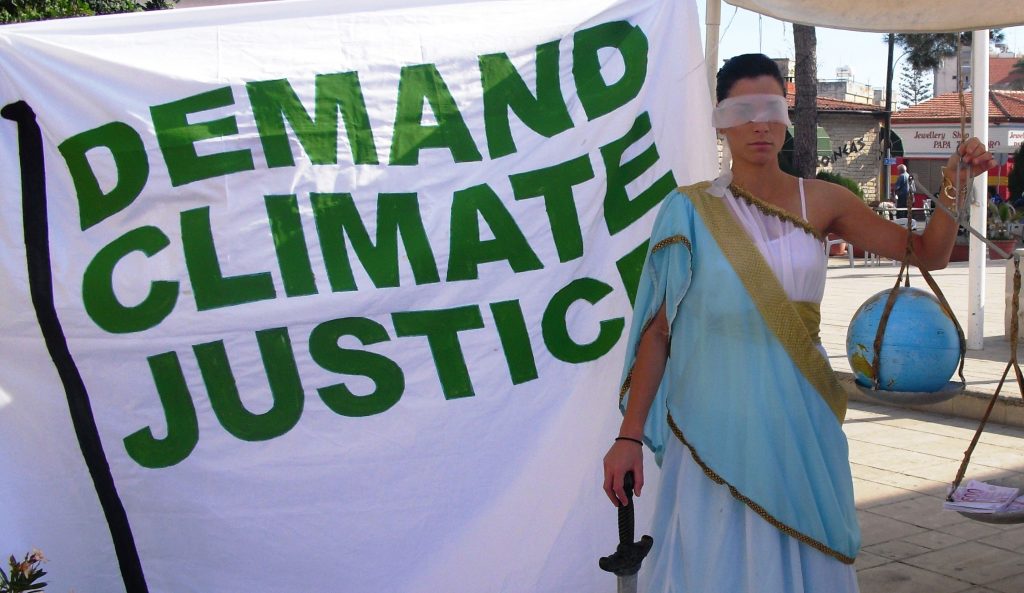Brussels, October 19, 2009 – European politicians will this week make critical decisions about what role Europe is prepared to play in the fight against climate change and Friends of the Earth Europe is urging them to commit Europe to fulfil its historical responsibility for causing the climate crisis.
European finance and environment ministers and heads of state meeting this month [1] will agree the position which the European Union will take to the UN climate talks, including targets for cutting emissions and funding to help poor countries deal with the impacts of a changing climate. The pressure is on them to make ambitious commitments and get the currently stalling international talks on track to deliver a fair and just agreement.
Sonja Meister, climate campaign coordinator for Friends of the Earth Europe, said: “This is an incredibly crucial moment. Europe is at a crossroads on the way to Copenhagen and ministers must choose the route away from devastating climate change and towards a fair and just global climate agreement. To keep hopes alive of a fair outcome in Copenhagen Europe must commit to cut emissions by at least 40% by 2020 within Europe and also provide its fair share of the finances needed to enable developing countries to tackle climate change.”
Friends of the Earth Europe believes the EU, like other industrialised countries, must live up to its historical responsibility for causing climate change, which means:
– cutting greenhouse gas emissions domestically by at least 40% by 2020 compared to 1990 levels, without offsetting. The Clean Development Mechanism (CDM) should be abolished as it deters the structural changes necessary in Europe to green the economy and deliver emission reductions. The majority of CDM projects do not deliver real emission cuts and many projects have devastating social and environmental consequences in the global South.
– delivering its fair share of the finance and technology needed to support developing countries mitigate climate change and adapt to its consequences. This new and additional finance needs to come from public money, be additional to development aid commitments and be administered through the United Nations. Any funding outside of the UN, including the World Bank’s climate investment funds, and any financial transfers made as part of offsetting schemes should not count as fulfilment of developed country commitments.
– the EU needs to support a second commitment period of the Kyoto Protocol which obliges developed countries to make further commitments on cutting emissions and provide finance and technology to developing countries. Attempts to derail the Kyoto Protocol must be stopped.
– forests must be kept out of carbon markets. Existing forests should be protected by halting deforestation, forest degradation and the conversion of forests into plantations. Any agreement on deforestation should be a rights-based approach and should not include carbon markets nor plantations.
– the next commitment period of the Kyoto Protocol needs a strong compliance regime that ensures that emissions in industrialised countries go down year by year. Too many parties, including a series of EU member states, have so far failed to deliver their commitments under the Kyoto Protocol. The urgency of climate change requires emission cuts to be delivered within short timeframes.
To help developing countries mitigate their emissions and adapt to the consequences of climate change the EU needs to contribute a minimum of 35 billion Euros per year by 2020. Global costs for supporting mitigation and adaptation in developing countries are estimated to be well in excess of 110 billion Euros, based on data from the European Commission [2], though recent studies suggest this could rise to the region of 340 billion Euros [3]. The EU’s fair share based on responsibility and capacity to pay would be about 30% of this amount.
Sonja Meister added: “If Europe doesn’t decide adequate emission reduction targets and funds for developing countries now the international negotiations could remain in deadlock. The world needs a fair and just climate agreement in Copenhagen – our ministers must now do their part to make this happen.”
***
NOTES TO EDITORS:
[1] ECOFIN – 20th October ECOFIN is a meeting of Finance Ministers from all EU member states. At this ECOFIN meeting, Finance Ministers will decide on the scale, sources and means of delivery for the EU’s share of funding for adaptation, mitigation and technology in developing countries. Lack of agreement on financing for developing countries is one of the key issues currently stalling progress on an agreement in time for Copenhagen.ENVIRONMENT COUNCIL – 21st October Environment Council is a meeting of Environment Ministers from all EU Member States. At this Environment Council, Environment ministers will decide on all elements of the EU’s position in Copenhagen, including reviewing and inserting the conclusions of the previous day’s ECOFIN meeting. The conclusions from Environment Council will define the negotiating mandate for the EU delegation going to Copenhagen.
EU COUNCIL – 29th -30th October EU Council (also known as European Council) is a meeting of Heads of State from EU member states. Heads of state will decide on the highest level of political aspects of the EU’s position.
[2] Commission Staff Working Document accompanying the Communication ‘Towards a Comprehensive Climate Agreement in Copenhagen,’ 28.1.2009 SEC(2009) at http://ec.europa.eu/environment/climat/future_action.htm [3] World Economic and Social Survey 2009, Promoting Development, Saving the Planet http://www.un.org/esa/policy/wess/wess2009files/wess09/overview_en.pdf






